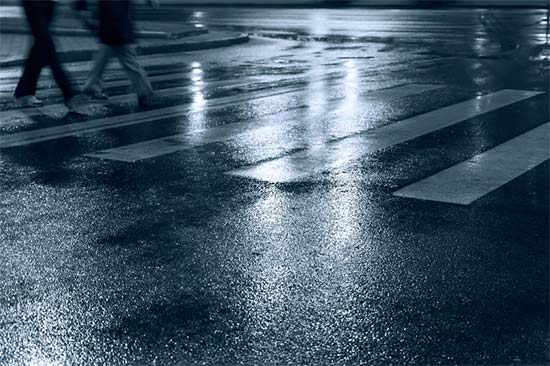Across the country, nearly 9 pedestrians suffer significant injuries in auto collisions every hour, and 12 are killed each day in such incidents. Nearly three quarters of collisions involving pedestrians occur at night. In Kansas, 20% of the total number of motor vehicle collisions involved pedestrians, in 2016.

What makes nighttime so dangerous for pedestrians?
- Lower visibility: Even with car headlights and street lights, a driver’s vision is significantly impacted during nighttime hours making it harder to spot a pedestrian especially at a distance. Motorists driving at night tend to be more attentive to other vehicles on the road than to pedestrians.
- Compromised perception: A motorist who is driving at the speed of 30-40 mph will easily see a pedestrian at an intersection from well over 200 feet away in day light. The same motorist driving at night may not notice a pedestrian until they get within 100 feet or less.
- Higher reaction time: In optimal conditions, including day light and a physically fit motorist, a reasonable reaction time is usually 0.2 – 0.5 second. This translates to approximately 30 feet at 30 mph. But at night, the reaction time may be sower, closer to 0.9 – 1.2 seconds. This equates to a distance of over 50 feet.
- Road conditions: When it’s dark outside, it is also harder to see surface conditions and hazards brought on by inclement weather. For instance, it can be nearly impossible to spot ice (particularly black ice), pot holes and small obstructions on the road.
- Fatigue: Driver fatigue can affect motorists at any point of the day. However, drivers will naturally be at an increased risk for drowsiness at night. Drowsiness, in addition to the other risks, makes the roads even less safe for pedestrians.
What can you do to avoid pedestrian crashes?
Although motorists and pedestrians tend to point fingers at each other following a collision, both parties can take steps to contribute to pedestrian safety. Here are a few things that you can do to greatly lower the risk of a collision.
As a pedestrian:
- • Wear bright colored and reflective clothing to make it easier for motorists to spot you.
- • If you’ve been drinking and are too impaired to drive, consider getting a friend or calling a cab to drive you instead of walking home.
- • Always use crosswalks at intersections and watch carefully for cars making a turn.
- • Look in the direction of oncoming traffic and try to make eye contact with any motorists, if you don’t have a crosswalk.
- • If you are accompanying kids, the elderly or those with compromised physical abilities, hold their hand or arm while crossing.
- • Don’t let children play outside alone, particularly near the road at or after dusk.
- • Avoid electronic device distractions when walking at night.
As a motorist:
- • Slow down. Consider the areas where it is even advisable to travel slower than the speed limit to allow for a better time to react.
- • Be particularly careful when you are near or driving through crosswalks.
- • Always yield to pedestrians on your side of the roadway.
- • Don’t drink and drive.
- • Don’t use a cell phone in any way and keep other distractions like GPS and music to a minimum.
- • Don’t try to pass vehicles that have stopped or are slowing at a crosswalk.
- • Use extreme caution when driving through residential areas.
In Kansas, you may be entitled to benefits through your own auto insurance company in addition to your claim for damages from other parties. Pedestrians involved in night time collisions often suffer significant injuries. With serious physical injuries, the potential for loss of income, and pain and suffering, damages are often hard to quantify. This makes it easy for the insurance companies to use this opportunity to drive down the value of your claim.
When insurance companies delay or deny your claim, contact an experienced attorney from DeVaughn James Injury Lawyers. We won’t settle for anything less than what you deserve. Our attorneys are well qualified and experienced in handling personal injury cases related to pedestrian collisions. Contact us today and we will make sure that you receive all the compensation you are entitled to.



